|
No NFL team manages to fill all of its holes during the offseason. Each has a weak point or two that gets revealed by injuries or disappointing play over the course of a season. Even the most successful offseasons of 2018 prove that point. The Bears surrounded Mitchell Trubisky with talent, acquired a dominant pass-rusher in Khalil Mack and won the NFC North, only for the kicker who signed a four-year extension to sputter out over the course of the year and collapse at the worst possible moment. The Colts needed to turn to midseason acquisition Dontrelle Inman when their wideouts were struggling to stay healthy. Every NFL team still has some work to do. In some cases, that's filling a roster spot or supplementing a positional group. In others, it's locking up a player who is about to hit free agency. Some teams have much more to do over the next few months than others. Over the next two days, I'll run team-by-team and try to identify the key things each has to accomplish before the calendar turns to September: JUMP TO A TEAM:
NFC East: DAL | NYG | PHI | WSH
NFC North: CHI | DET | GB | MIN
NFC South: ATL | CAR | NO | TB
NFC West: ARI | LAR | SF | SEA  NFC East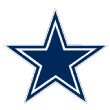 Dallas CowboysRe-sign Dak Prescott and Amari Cooper. Early negotiations with the cornerstones of Dallas' passing attack haven't yielded much. Executive vice president Stephen Jones suggested that Prescott's deal needs to be "team-friendly," which is his own coded way of asking Prescott to give up his leverage and take a discount. It's probably not going to work in an organization with a long track record of handing its drafted-and-developed talent market-setting deals. Russell Wilson's four-year, $140 million extension set a new annual average record at $35 million per season. As I wrote in April, the Cowboys' predilection for longer deals with their stars means that Prescott is likely to approach a record for total contract value as opposed to topping Wilson's average. This deal is going to get done unless the Cowboys want to trust the same instincts that led them to pursue Paxton Lynch and Connor Cook before settling for Prescott during the 2016 draft, and they're not that dumb. Prescott is likely to get a five- or six-year deal in the range of $32 million per season. 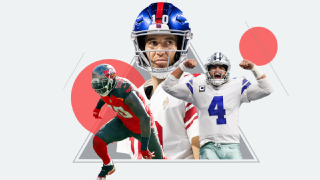 With Prescott, the Cowboys at least have the leverage of knowing that their star quarterback is making about 6 percent of his actual market value. They have no such leverage with Cooper, who is making $13.9 million as part of his fifth-year option and reportedly has made "shockingly high demands" in extension talks with the Cowboys. There's some gamesmanship and negotiating in public going on here, but what could the Cowboys have expected? Dallas traded a first-round pick for Cooper in a desperate attempt to kick-start its passing attack, and it worked. Cooper caught 66 passes for 896 yards and seven touchdowns in 11 games with the Cowboys, who started 3-4 without him and then went 8-3 after the wideout arrived from Oakland. Cooper is still just 24 and plays at a position in which drafts haven't delivered much talent, so the Cowboys wouldn't have many possible replacements if they did decide to let Cooper leave. They could franchise Cooper twice and pay the Alabama product about $53 million over the next three seasons. That's right around what Odell Beckham Jr. ($52.7 million) and Mike Evans ($55 million) got from their extensions as fifth-year stars last August. The Cowboys probably will have to pay Cooper $58 million over the next three years as part of his extension to get this deal done. It's a lot of money, but once they traded for Cooper and he succeeded, they were basically handing his agent a blank check. If the Joneses really think Cooper isn't worth the money for which he's asking -- and to be clear, I don't think this is what they actually believe -- they should trade Cooper now in lieu of letting him play out this fifth-year option and walking for a third-round compensatory pick. Cooper's value might never be higher after last season, and there are a handful of teams that should be willing to offer significant draft compensation for a rejuvenated Cooper. The Patriots, Jaguars, Seahawks and Packers all come to mind as teams that could use receiving help, although they might not be enthused about giving up a first-round pick and making Cooper the highest-paid wideout in football. As the Cowboys showed last year, though, it takes only one interested party to make a market.
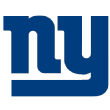 New York GiantsEstablish a succession plan for Daniel Jones. The first time the Giants tried to move on from Eli Manning went about as disastrously as any benching in recent memory. The fans already had turned on then-coach Ben McAdoo in the middle of a disastrous 2017 campaign, but the move to bench Manning for unloved former Jets backup Geno Smith attracted universal scorn. Ownership quickly backtracked from the decision, fired McAdoo and general manager Jerry Reese, and promoted Manning back into the starting role. This will be different, in part because there's a more significant candidate looming behind Manning in the No. 6 overall pick, Jones. Opinions are split on the Duke quarterback, but the vast majority of Giants fans want to see him suit up and start getting NFL reps. There was no such groundswell for 2017 third-round pick Davis Webb, who never ended up playing for the organization. If ownership remains concerned about letting Manning save face on the way out, it should establish a transition plan before the season even begins. Make it public that this will be Manning's last season in a Giants uniform, given that he is in the final year of his deal. (This would go against GM Dave Gettleman's suggestions that the Giants could sit Jones for three years, but it's hardly as if Gettleman's news conferences should be treated as gospel after the OBJ trade.) Admit that the team will turn to Jones if the Giants fall out of playoff contention. Induct Manning into the team's ring of honor for the home finale against the Eagles in Week 17. In short, get ahead of the Manning transition instead of springing it with a moment's notice or daring the fans to chant for Eli's head every time he throws an interception during September. The Giants screwed things up last time, but this is their chance to get it right. Add an edge rusher. The Giants were already thin on the edge before trading Olivier Vernon; though they took a flier on Markus Golden and spent a third-round pick on Oshane Ximines, defensive coordinator James Bettcher could still use at least one more meaningful contributor to rotate in at outside linebacker. Nick Perry is still available as a free agent, and though the Packers grew frustrated with their former first-round pick, he is only two seasons removed from an 11-sack campaign.
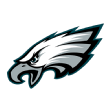 Philadelphia EaglesTalk to the Steelers about Artie Burns. The Eagles, in their own way, hold a unique position of power over their in-state rivals. Philadelphia signed Steelers linebacker L.J. Fort to a three-year, $5.5 million deal with $1.9 million guaranteed this offseason, presumably to serve as a backup linebacker and special-teamer. In doing so, the Eagles impacted the Steelers' compensatory pick formula. The Eagles would stand to gain a fourth-round pick by cutting Fort, who is canceling out the loss of Jordan Hicks to the Cardinals. The Eagles were eventually able to sign Zach Brown to help replace Hicks, squeezing their roster spots further at linebacker. Fort holds an even more interesting spot in the compensatory universe for his old team. As expected, the Steelers netted a third-round compensatory pick for Le'Veon Bell when their star back signed with the Jets. In a rare foray into unrestricted free agency, though, Pittsburgh signed Chiefs cornerback Steven Nelson and Jags wideout Donte Moncrief to deals. At the moment, the Steelers are still in line to net that third-rounder for Bell, but if the Eagles cut Fort, Pittsburgh would lose a third-rounder and the only compensation it has to show for Bell. 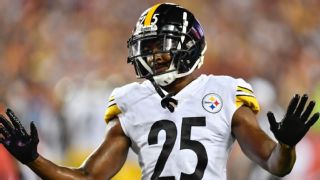 The Steelers could then cut Moncrief to keep Bell's pick alive, but they paid the 25-year-old $3.5 million in guarantees as part of a two-year, $9 million pact, nearly twice as much as Fort's guarantee. They are really hoping that Fort does well in his new home. The Eagles could cut Andrew Sendejo to free up that fourth-round pick, but Howie Roseman is one of the most creative general managers in the league. He also loves trades and taking shots on cheap cornerbacks with upside. The Steelers have one of those in the former first-round pick Burns, who took a massive downturn in his third season and was benched for the second half of 2018. Pittsburgh declined Burns' fifth-year option and replaced him with Nelson, so he's not long for the roster. The Eagles, on the other hand, might very well want to take a flier on a player who looked like a starting-caliber cornerback in 2017. Could the Eagles and Steelers work out a deal whereby Burns heads to Philadelphia for a sixth-round pick and the Eagles (make a gentleman's) promise to keep Fort on their roster all year, therefore locking in the Bell compensatory pick?
 WashingtonLock up Brandon Scherff. The only concern Washington could have with its 2015 first-round pick is health; Scherff has missed 10 games over the past two years, eight of which came as a result of a torn pectoral last season. The injury shouldn't give the team any pause in re-signing the star guard, who made the Pro Bowl in 2016 and 2017. The former fourth overall pick is set to play out his fifth-year option at $12.5 million, and Washington should have been more aggressive about re-signing him in January to create cap space, but that's in the past now. There's no reason to wait any longer to lock up the Iowa product. It's going to cost Washington a lot of money, but putting it off will just make Scherff even more expensive to retain. The number to watch here is $15 million per season. No guard has ever hit that average annual salary on an extension, with Zack Martin atop the market at a $14 million average figure on his deal with the Cowboys. Scherff has a large cap hold, two Pro Bowls in his back pocket, and the ability to attract possible interest as a tackle candidate in free agency, which would drive his market value up even further. A five-year, $75 million extension is likely where this ends, and that would make sense for both parties. 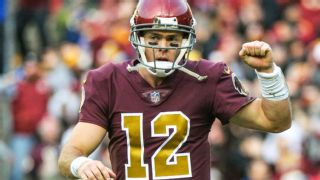 Move on from a quarterback, but not yet. I can't recall a season in which a team carried four quarterbacks on meaningful salaries throughout an entire campaign, and even given that Alex Smith is extremely unlikely to play in 2019, I wouldn't count on Washington to be the first. The team is locked into Dwayne Haskins and Smith, which would leave coach Jay Gruden to pick between Colt McCoy and Case Keenum, both of whom are free agents after the season. Barring some stunning injury, there aren't any starting quarterback spots left open. A handful of teams could consider upgrading their backup, including the Jaguars, Cowboys, Eagles, Packers, Vikings and Seahawks. Washington's job is to stir enough fear into one of those front offices to get a fifth-round pick and save a minimum of $3 million. Explore the wide receiver market. Gruden doesn't have much to show for his investments at wideout. The organization just turned down the fifth-year option for Josh Doctson, who hasn't posted a 100-yard game as a pro. Paul Richardson, who signed a five-year, $40 million deal last offseason, has a history of injuries and played just seven games last season. Richardson will start on one side, but Washington is otherwise looking at rotating between Doctson, third-round pick Terry McLaurin, and the likes of Brian Quick and sixth-rounder Kelvin Harmon on the other. It didn't find a replacement for departed slot wideout Jamison Crowder, and though Trey Quinn should get first crack at that role, Washington should be monitoring the market to try to add help over the summer. Jermaine Kearse could make sense.
NFC North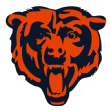 Chicago BearsFind a kicker. The Bears are generally set with the majority of their roster. Their one obvious point of weakness, of course, is at kicker. Cody Parkey is gone, and though Bears fans saw Robbie Gould's trade request and started to pull mothballs out of their old jerseys, it doesn't appear that the 49ers are going to acquiesce and deal Gould back to the Midwest. It's also fair to note that Gould's two excellent seasons in San Francisco have seen the 36-year-old convert 96 percent of his field goals, but Gould was down at 82.3 percent over his final two seasons in Chicago. I don't think the Bears should trade serious draft capital to the 49ers to acquire their former kicker, but Gould would be better than the kickers the Bears have on the roster, a list that includes the likes of Chris Blewitt, Elliott Fry and Eddy Pineiro. A more realistic option would be going after former Falcons kicker Matt Bryant, who -- admittedly while playing his home games indoors -- hit 95.2 percent of his field goals last season and has been at 88.2 percent over the past decade with the Falcons.
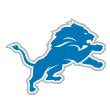 Detroit LionsAdd defensive line depth. The Lions essentially swapped out Ezekiel Ansah for Trey Flowers this offseason, and though that's an upgrade, the Lions could still use more to work with their core of Flowers and Damon Harrison. Someone to rotate on the inside and serve as a pass-rusher would make sense. The highest-profile option left on the market would represent a homecoming in Ndamukong Suh, but it's unclear whether Detroit would be interested in a reunion after Suh left in free agency for the Dolphins years ago. More feasible options are Muhammad Wilkerson and Corey Liuget.
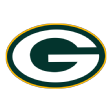 Green Bay PackersResolve Mike Daniels' future. As the Packers transition away from the Clay Matthews era on defense, they're about to hit a crossroads with another defensive stalwart. Daniels has arguably been the Packers' best defender when healthy over the past few seasons, but the 2017 Pro Bowler just turned 30 and is entering the final year of his deal. The Packers also appeared to signal a different direction with their moves this offseason. General manager Brian Gutekunst targeted height and arm length with his defensive line additions this spring. The Packers signed 6-foot-4 Za'Darius Smith and 6-foot-5 Preston Smith to play on the edge, and then supplemented those selections by drafting 6-foot-5 Rashan Gary in the first round. Gutekunst also drafted 6-foot-3 Kingsley Keke to play on the interior, where he would be backing up the likes of 6-foot-3 star Kenny Clark and 6-foot-5 Dean Lowry. Daniels, who could figure as a defensive end or a tackle depending on the situation, is an even 6-foot. The Packers also structured their offseason deals to hand significant raises to the two Smiths and fellow free-agent additions Adrian Amos and Billy Turner in 2020; the four signings will combine for a cap hit of $23.4 million this year, but that figure rises to $47.8 million next season. Green Bay has players such as Bryan Bulaga and Mason Crosby coming off the books in 2020, but the significant investments at defensive line suggest that it might not intend to keep Daniels after this season. 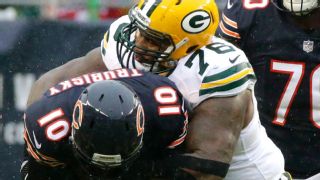 If that's the case, should the Packers think about trading Daniels? There's no guarantee they will get a compensatory pick for Daniels next offseason given Gutekunst's interest in free agency, and they could still bring back Muhammad Wilkerson as a rotational piece after his 2018 season with the team was cut short by an ankle injury. A trade also would allow the Packers to save $7.6 million in cash and roll over $8.3 million onto their 2020 cap. On the other hand, if the Packers just want to load up on defensive line depth and emulate the Eagles, they should work on re-signing Daniels now. Add a veteran wide receiver. One position the Packers failed to address altogether this offseason was wideout, where they'll return Davante Adams and his trio of spectacularly named sidekicks in Geronimo Allison, Marquez Valdes-Scantling and Equanimeous St. Brown. The latter two are entering only their second season and still have plenty of time to develop, of course, but it seems like the Packers could do more to give Aaron Rodgers options. This is the same guy who turned James Jones into a valuable wideout out of thin air in 2015, at least in name. It surprised me that the Packers didn't take a shot at one of the veterans whose markets didn't materialize, and I still wonder if they might look toward one of the few remaining receivers left in Pierre Garcon. The former Colts draftee was cut after two seasons in San Francisco, where he missed 16 of 32 games with injuries, but the 32-year-old was reasonably productive over an eight-game stretch with C.J. Beathard or Brian Hoyer as his quarterback in 2017. Garcon also has played under Kyle Shanahan, who has a long-standing relationship with new Packers coach Matt LaFleur, so the playbook shouldn't be an issue. Green Bay shouldn't give up on their young wideouts, but mixing in Garcon early in the year and seeing if there's anything left in the tank would make a lot of sense.
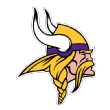 Minnesota VikingsReplace Laquon Treadwell. The fifth-year option pickups for players such as Jared Goff and Carson Wentz were about as certain as any NFL decision worthy of a press release. On the other end of the spectrum, the Vikings' decision to decline Treadwell's fifth-year option after three disappointing seasons was similarly obvious. The former Ole Miss star is hardly a lock to make the 53-man roster in Minnesota. The Vikings, of course, don't need a starting wideout. They have the best one-two punch in football with Stefon Diggs and Adam Thielen, each of whom are locked in for the long term. After those two, well, things get scary. There's Chad Beebe, who could take some slot targets in 2019. The Vikings used seventh-round picks on Dillon Mitchell and Olabisi Johnson, but there's nothing more than hope in the cupboard. It's also worth noting that Diggs hasn't completed a single 16-game season as a pro, even if you figure that the Vikings will use more 12 personnel after drafting Irv Smith Jr. in the second round. Minnesota could very well look toward Pierre Garcon or someone like Michael Crabtree in free agency. Trade candidates also could make sense. Bennie Fowler is buried on the Giants' depth chart and played under Vikings offensive adviser Gary Kubiak in Denver, although Fowler might not be much of an upgrade over Treadwell. A post-hype option like Keelan Cole, who impressed in his rookie season before struggling and losing his starting job with the Jaguars last season, also could make sense for a sixth- or seventh-round pick.
NFC South
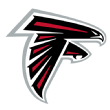 Atlanta FalconsWork out an extension with Grady Jarrett. The Falcons didn't add anyone more significant than Adrian Clayborn to their disappointing defensive line this offseason, so they're clearly counting on holdovers such as Vic Beasley Jr. and Jarrett to play up to their potential in 2019. Beasley, entering the final year of his deal, is the definition of a wait-and-see contract candidate, but the Falcons clearly see Jarrett as a cornerstone of their defense. They franchised him this offseason, giving the 26-year-old a raise from $1.9 million to $15.2 million for 2019. Jarrett signed his tender in April, but the Falcons have until July 15 to work on an extension with their defensive tackle. 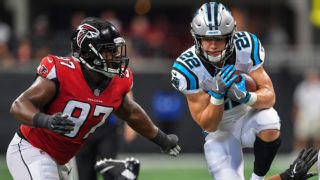 Jarrett doesn't have the sort of pass-rushing production we've seen from interior disruptors like Aaron Donald, so he can't expect to get that sort of deal. The closest comparison might be someone like Kawann Short, who signed a five-year, $80 million deal after being franchised by the Panthers in 2017. The cap has risen by 12.7 percent since then, so Jarrett might very well ask for five years and a hair over $90 million for his own deal. Lock up Deion Jones. The Falcons haven't fielded a great defense by advanced metrics over any of the past three regular seasons, but when they have looked good, it's been with Jones on the field. He was a regular in 2016 and 2017 before missing most of 2018 with a foot injury, and the Falcons felt the difference. Over the past three years, they've been competent with Jones on the field and a sieve without him: Re-signing Jones is a must, but the team can't love what happened at middle/inside linebacker this offseason. The top of the market for off-ball linebackers had been at an average annual salary of $12.5 million, but three different players topped that mark. Anthony Barr and Kwon Alexander came in at $13.5 million per year, although Alexander's deal is really a one-year, $14.3 million pact. The Jets then blew up the market by giving C.J. Mosley a five-year, $85 million deal, good for $17 million per season. Jones might very well ask for a Mosley-sized deal, but it's hard to believe Jones would get that sort of contract in free agency. He just doesn't have Mosley's résumé. More plausibly, Jones could end up somewhere around the old top of the market with a four-year, $54 million deal. Re-sign Julio Jones. I covered the particulars of a Julio extension in February, and the top of the wideout market hasn't changed. Jones is still likely to come away with a five-year deal between $95 million and $100 million.
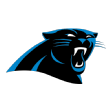 Carolina PanthersLock up James Bradberry. As the cornerback former general manager Dave Gettleman drafted to replace Josh Norman, Bradberry has been pushed into the starting lineup since Week 1 of his rookie year. The returns have generally been good. The 25-year-old Bradberry has played like an above-average cornerback for three years running, although the entire defense collapsed during a disastrous second half last season. The only thing missing from Bradberry's game has been takeaways. He has forced two fumbles and picked off five passes in 45 games, which is part of why Panthers fans took to Donte Jackson when the rookie picked off four passes in the first half of 2018. Interceptions are a poor way to judge defensive backs and less sticky from year to year than just about any other individual statistic. Bradberry could play just as well in 2019 as he has in previous years and piece together a five-interception campaign on sheer randomness. In an NFC South in which the Panthers could face Julio Jones, Michael Thomas and Mike Evans six times if everyone stays healthy, good cornerback play is critical. Even if Jackson continues to develop, the Panthers need to keep Bradberry. He won't be able to command the $15 million annual average Xavien Howard got in a relatively team-friendly deal from the Dolphins, but Bradberry's new contract should come in between $12 million and $13 million per campaign.
 New Orleans SaintsSign a rotation defensive end. I have to admit: It was difficult to find something for the Saints to do in this exercise. They don't have any obvious holes in the starting lineup, and they have depth at just about every key position. You really have to nitpick to find a place where the Saints might look to use the $8.3 million in cap space they have left for 2019. The one place I'd like to see the Saints add a piece is on the edge. Cameron Jordan is a Defensive Player of the Year candidate at one spot. On the other side, the Saints have two first-round picks invested in Marcus Davenport, but the Texas-San Antonio product was slowed by a toe injury during his rookie season. Last year's starter at that position, Alex Okafor, left for the Chiefs, leaving Trey Hendrickson -- who has played just 17 games over his first two seasons and recorded two sacks -- as the primary backup at defensive end. 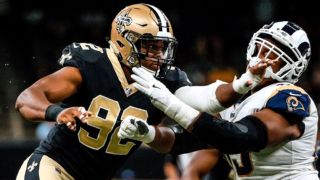 Defensive coordinator Dennis Allen could use another piece to fill in off the edge and take snaps as an interior pass-rusher, especially given that Sheldon Rankins is recovering from a torn Achilles and might not be ready for an every-down role in September. Finding someone who can do that at a high level who hasn't already taken an offer somewhere else will be difficult. This would have been a perfect landing spot for Chris Long, but the Eagles defensive end retired on Saturday. As it is, the Saints likely will end up needing to monitor the training camp cuts to see if a useful veteran hits the market. If Gerald McCoy is willing to take a one-year deal in the $5 million range, that would work great. Lock up Michael Thomas. The Saints might prefer to wait until after the season to re-sign their stud wide receiver, but the 26-year-old Thomas -- who has 33 more receptions through his first three seasons than any other player in NFL history -- is only going to get more expensive if the Saints wait. There's a good chance Thomas is the first $20 million-per-year wide receiver in NFL history if the organization waits for A.J. Green and Julio Jones to sign their deals and pushes the Thomas extension out until 2020.
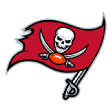 Tampa Bay BuccaneersPlan for a season without Jason Pierre-Paul. Regardless of whether JPP ends up getting neck surgery or not, it's clear that the former Giants star is going to be out for a long time while he recovers from a serious car accident. Coach Bruce Arians suggested that the best-case scenario for Pierre-Paul would involve a five-month recuperation period, which would bring him back during mid-October. Even if that were to happen, JPP would need to get into playing shape, which would mean a part-time role at best for several weeks. The Bucs can't count on getting anything close to the JPP who racked up 12.5 sacks and 20 knockdowns a year ago. They'll have to adapt. For one, it should encourage Tampa to bring back Gerald McCoy, who immediately returns to his prior spot as the Bucs' most imposing pass-rusher. I get that Tampa has Carl Nassib and saw the Browns castoff impress last season, but McCoy is simply a different caliber of player. Without McCoy, the Bucs would be rotating through guys such as Nassib, William Gholston, Noah Spence and fourth-round pick Anthony Harris on the edge. They need more. (Editor's note: The Bucs are releasing McCoy on Monday, according to ESPN sources.) This would have been an ideal landing spot for Ziggy Ansah before the former Lions standout signed a deal with the Seahawks. As is, the Bucs are likely stuck going after someone like Nick Perry and hoping for the best. Arians and defensive coordinator Todd Bowles were able to coax successful late-career seasons from pass-rushers John Abraham and Dwight Freeney in Arizona, so it wouldn't be shocking if the Bucs generated a useful campaign from a veteran edge rusher.
NFC West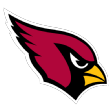 Arizona CardinalsAdd a backup for Kyler Murray. Though the Cardinals needed to trade away Josh Rosen after drafting Murray with the first overall pick, the deal left the Cardinals without a recognizable backup for their new signal-caller. Arizona's sub-Murray depth chart at quarterback includes Brett Hundley, Chad Kanoff and Drew Anderson. Not ideal. I doubt coach Kliff Kingsbury wants to suit up himself behind Murray, so let's hope the Cards find a solution. The most obvious move would be to acquire Case Keenum from Washington if the former Houston product doesn't make it ahead of Colt McCoy, given Keenum's comfort with the Air Raid offense. Sign a replacement for Patrick Peterson. With their star cornerback down for the first six games of 2019 after being popped for a PED suspension, the Cardinals are going to be a mess in the defensive backfield. They've made additions this offseason by signing Robert Alford and drafting Byron Murphy in the second round, but Alford was torched in Atlanta last season, and even good cornerbacks tend to struggle as rookies. The Cardinals shouldn't plan on moving on from Peterson; if anything, this should help drive down his upcoming contract extension. Adding a veteran to help shoulder the load while Peterson is out would be a good idea. There are still options left on the market, most notably former Jets starter Morris Claiborne. He would be an upgrade over veterans such as Tramaine Brock and David Amerson, who might otherwise be in line to play meaningful snaps in September and October.
 Los Angeles RamsAdd a defensive lineman. The Rams will theoretically hand some of Ndamukong Suh's snaps to the likes of Tanzel Smart on the inside and Clay Matthews on the edge, but they could still justify adding one more defensive lineman to supplement one of the league's best units. That lineman could very well be Suh, who is still a free agent, but the Rams realistically might not have the cap flexibility to give Suh another one-year deal north of $10 million. They have only $6.6 million in space, and though they could restructure the deals of Aaron Donald or Brandin Cooks to create more room, general manager Les Snead also intends to lock up Marcus Peters with an extension this summer. The Rams will need to shop for lower-cost options with some upside. Muhammad Wilkerson would make a lot of sense here. Snead is no stranger to a trade, of course, and shopping for a young player with untapped upside would also seem logical. Could the Rams hope Wade Phillips coaxes an impressive campaign out of a former first-rounder like Shaq Lawson or Robert Nkemdiche? Both likely will be on the trade market this summer. Extend Peters. The former Chiefs star had an uneven first season in Los Angeles, but it's clear that the Rams see the ball hawk as a building block for their defense. Given the deals they've handed to players such as Cooks and Todd Gurley II in recent years, it's also clear that the Rams have no qualms about paying over the norm for one of those young stars. It wouldn't be shocking if Peters ended up challenging the likes of Trumaine Johnson and Josh Norman for the richest active cornerback deal. Xavien Howard topped Norman's five-year, $75 million contract with a five-year, $75.3 million pact, but the structure of the deal isn't generous. Peters could very well come away with a five-year, $80 million extension and be guaranteed to see most of that money.
 San Francisco 49ersSolve the running back logjam. The 49ers could call on as many as four viable halfbacks next season in Jerick McKinnon, Tevin Coleman, Matt Breida and Raheem Mostert. McKinnon signed a four-year, $30 million deal with the club last offseason, then tore an ACL and missed the entire campaign. The 49ers paid him $12.5 million for that one season, but he's under contract at a $3.7 million base for 2019. 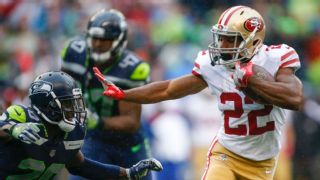 Keeping four backs doesn't make a lot of sense, especially when you want at least one of them to regularly play special teams. Coleman is virtually guaranteed a roster spot and doesn't play special teams. McKinnon was only a regular special-teamer for the Vikings in 2015. Breida was a regular in 2017, but he moved off special teams as he took over the starting role and struggled with a high ankle sprain last season. Mostert was productive in a limited role last season, and though he bounced around the league before ending up in San Francisco, the 49ers gave him a three-year, $8.7 million deal this offseason. He's going to figure in the lineup, likely as a special-teamer and occasional back off the bench. The 49ers guaranteed Mostert only $1 million, so they could still move on, but it seems likely that he and Coleman are on the 53-man roster. That leaves Breida and McKinnon to compete. The 49ers could probably carry them both, but is it really an effective use of their roster spots and playing time? McKinnon offers more as a receiver and allows the 49ers to disguise their intentions pre-snap, which has been key for Shanahan, but Breida has been better between the tackles and might be a better contrast to Coleman. He has been more efficient than McKinnon on a carry-by-carry basis, although Breida's 5.3 yards-per-carry figure from a year ago is a bit inflated, given that he was 30th in success rate. Would the 49ers rather pay $3.7 million for McKinnon or $645,000 for Breida? Given that the free-agent deal clearly suggests that the 49ers see McKinnon as a game-changing back, my guess is that they'll lean toward McKinnon. If that's the case, they should see whether anyone would be interested in trading for Breida, who will be a restricted free agent after the season.
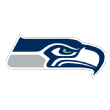 Seattle SeahawksLook into wideouts. The Seahawks released Doug Baldwin earlier this month, and though they drafted DK Metcalf in the second round and Gary Jennings Jr. in the fourth, the only guys on this depth chart guaranteed a roster spot are Metcalf and Tyler Lockett. The Seahawks could head to September with Lockett, Metcalf, Jennings, David Moore and Jaron Brown as their five wideouts, but it would be foolish to pretend that the Seahawks couldn't upgrade by giving at least one veteran a shot in camp. The usual suspects figure here. Michael Crabtree and Pierre Garcon are still free. Rishard Matthews was a starting wide receiver in the NFL in 2017 before a bizarre 2018 campaign. Jermaine Kearse, who was involved in some of the biggest plays in franchise history, is also still available. A reunion with Kearse, at least for a training camp tryout, would seem to make sense. Lock up Bobby Wagner. I didn't agree with the arguments people made for moving on from Earl Thomas, but those same arguments don't apply to Wagner. The biggest worry about Thomas was injury, and Wagner has missed just two games over the past four seasons. He hasn't been the same sort of publicly disruptive force Thomas was in asking for a new deal. The Seahawks also don't have the same sort of cap constraints in 2020, given that they stand to have nearly $69 million in room. If anybody stood to be furious about the C.J. Mosley deal besides the Ravens, though, it was the Seahawks. The Jets' paying an astronomical sum for Mosley means that the Seahawks will have to do the same for their star linebacker. One NFL team's projection for Mosley heading into free agency saw the Ravens standout coming away with a five-year deal between $70 million and $75 million with $35 million guaranteed at signing. Mosley instead signed a five-year, $85 million deal with $43 million guaranteed at signing and $51 million in practical guarantees. Wagner could very well ask the Seahawks to top that deal. I don't think the Seahawks really have a choice after letting Thomas leave, either. Wagner could very well be looking at a four-year, $72 million extension to stay in his NFL home.
|

